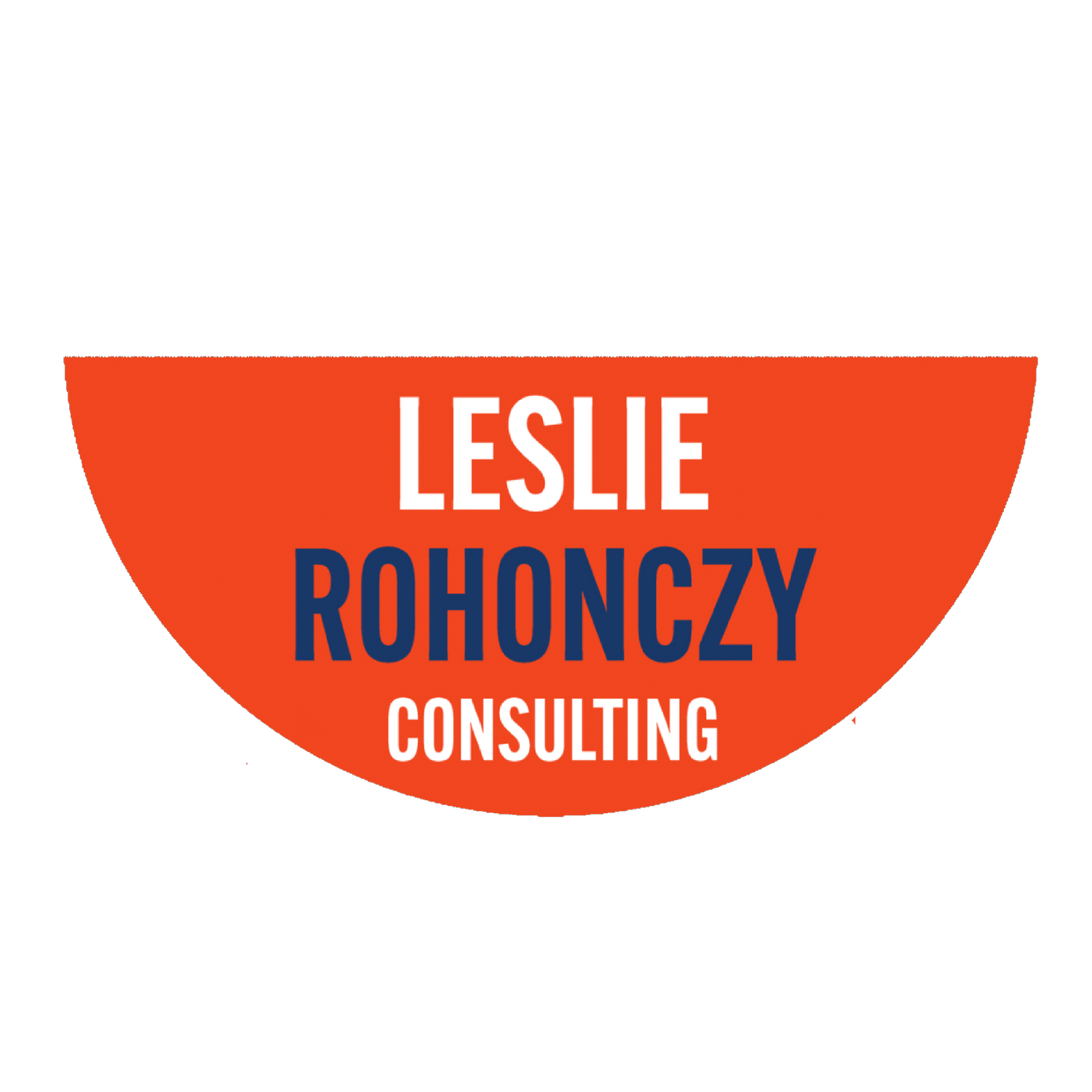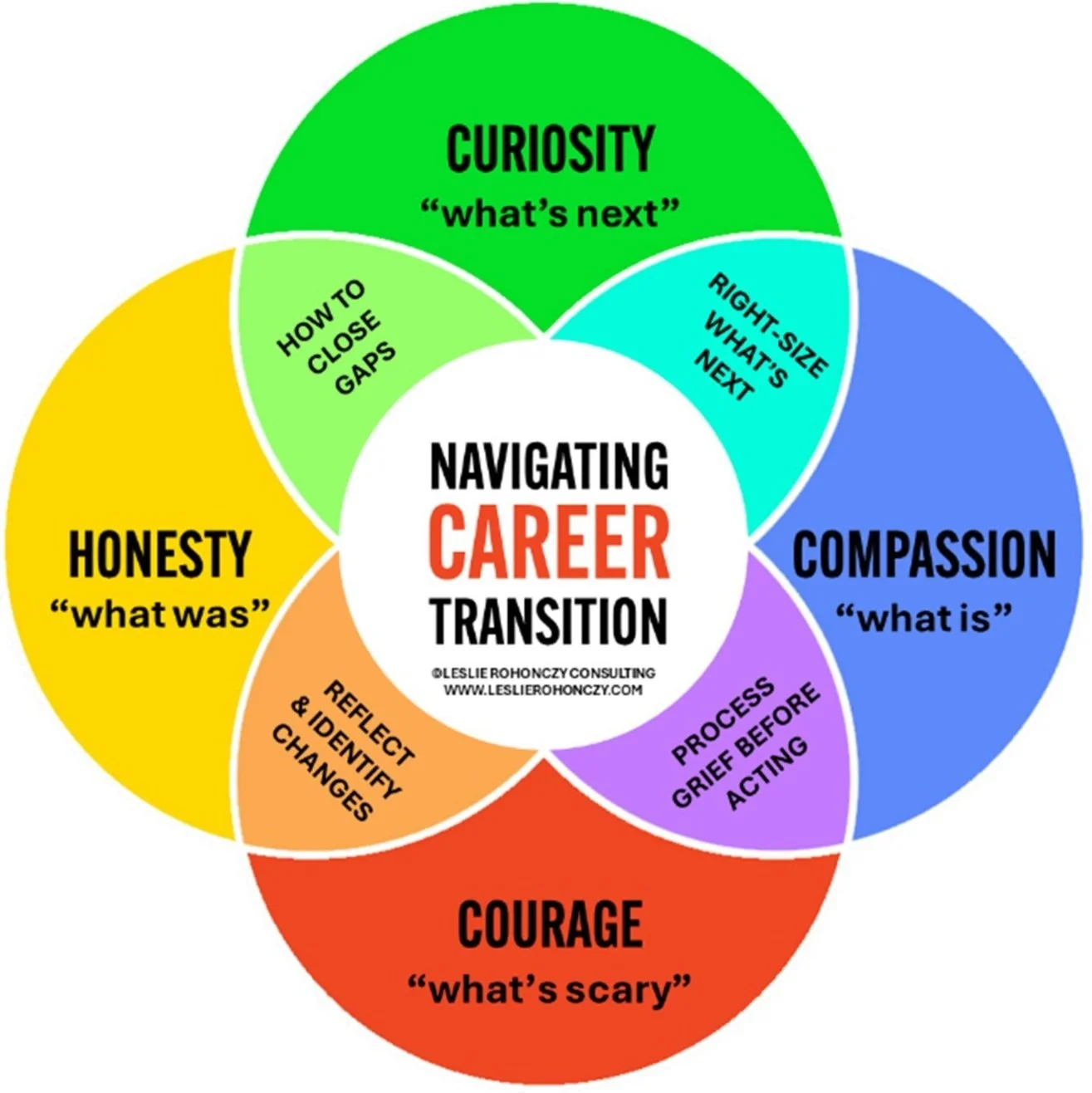Turning Turbulence Into Opportunity
Career transitions are among the most challenging moments in our professional journey. Whether we’re stepping into a new role, considering a significant pivot, or facing the unexpected disruption of being let go, the emotional and practical demands can feel overwhelming. And on top of all that, the uncertainty of “what is,” the grief of “what was,” and the fear of “what’s scary” often collide, leaving us unsure how to move forward into “what’s next”.
This is why I created the Career Transition Model. Grounded in four core qualities – Curiosity, Compassion, Courage, and Honesty – this framework provides a structured, human-centered approach to navigating the complexities of career change. By focusing on each section of this model, we can transform a tumultuous experience into an opportunity for clarity, growth, and meaningful next steps.
Let’s explore the model in depth and uncover the benefits of focusing on each element in the transition.
1. COMPASSION: Accepting "What Is"
This is a tough time – it’s time to be gentle with yourself. When faced with career disruption, it’s natural to feel a range of emotions: grief, frustration, shame, or even anger. Compassion invites us to sit with these feelings without judgment. Instead of rushing to act or denying our emotions, this stage encourages us to:
• Acknowledge and honor what we’re feeling.
• Give ourselves the grace to process our grief or disappointment.
• Treat ourselves with the same kindness and understanding we would extend to a friend.
Compassion is about being present with our reality, no matter how uncomfortable it may feel. It’s the foundation for healing and ensures that our next steps come from a grounded and intentional place. Compassion creates space for emotional processing and clarity, reduces self-criticism, promotes self-acceptance, and prevents burnout by prioritizing emotional well-being.
2. HONESTY: Reflecting on "What Was"
Transitions are an opportunity to reflect on the past with clarity and honesty. This doesn’t mean dwelling on what went wrong, but rather assessing what worked and what didn’t in our previous role or career, so that we can identify limiting beliefs, behaviour patterns, strengths to be leveraged, and areas for growth to close gaps. It required us to ask ourselves tough but valuable questions like: “What lessons can I carry forward?” “What was I good at that I want to do more of?” “What gaps do I need to address?”
Honesty with ourselves – or what I like to call ‘accurate self-assessment’ – requires us to reflect on our past performance and engagement, so that we can move forward with a deeper understanding of what we need in order to thrive in our next chapter. This level of honestly with ourselves is a key step in the process because it promotes self-awareness and growth, provides clarity on what’s truly important to us, helps us identify gaps to be closed, and aligns our next steps with our values.
3. COURAGE: Facing "What’s Scary"
Fear often accompanies career transitions. The fear of failure, rejection, or making the wrong decision can feel paralyzing. Courage is about acknowledging our fears, leaning into them, and taking action that helps us overcome them. It’s about asking ourselves: “What am I afraid will happen?”, “What risks am I willing to take to move forward?” “What do I need to have / feel / believe in order to face this uncertainty with resilience?” “What’s one small step I can take today to address my biggest fear?”
Courage doesn’t mean eliminating fear; it means not letting fear dictate our choices. By taking small, intentional steps, we build momentum and confidence, even in the face of uncertainty. Acting with courage empowers us to take action despite our fear, builds resilience and confidence over time, and helps us confront challenges head-on, rather than avoiding them.
4. CURIOSITY: Exploring "What’s Next"
Curiosity invites us to lean into the unknown with a sense of openness and possibility. Rather than viewing this transition solely as a loss, curiosity encourages us to ask, “What opportunities might this open up for me?” “What have I always wanted to explore but haven’t had the chance to?” “What skills or passions can I leverage in new ways?”
This mindset shift allows us to see beyond the immediate turbulence and imagine our ideal state, and the potential of what could be. Curiosity is not about having all the answers – it’s about giving ourselves permission to wonder and explore, and cultivating the courage to dream without the pressure of immediate certainty. Maintaining our curiosity through this process encourages creative thinking and new possibilities, helps us shift from a reactive to a proactive mindset, and opens doors to opportunities we might not have considered before.
THE POWER OF INTEGRATION: The Intersections of the Model
Here’s where the Career Transition Model gets exciting: the intersections between these four qualities take us deeper, where meaningful action and transformation happen:
• COMPASSION + COURAGE = Process your grief and other uncomfortable emotions before acting.
• COURAGE + HONESTY = Self-reflect and identify the changes you want to make.
• HONESTY + CURIOSITY = Consider how you will close the gaps you’ve identified, and what you’ll need in your next role.
• CURIOSITY + COMPASSION = Combine expansive thinking with self-compassion as you dream boldly, and right-size what’s next.
WHY COACHING MATTERS DURING CAREER TRANSITIONS
It can be challenging to navigate career transitions alone. Working with an Executive Coach to help guide you in navigating the Career Transition Model can provide a deeply transformative, supportive, and human-centered program.
Executive coaching provides:
• A safe, judgment-free space to explore your emotions and aspirations.
• Tailored strategies and support to help you stay focused and grounded.
• Practical tools and accountability to move forward with confidence.
If you’re navigating a career transition, coaching can help turn uncertainty into clarity and fear into opportunity. Whether you’re an executive seeking career guidance, or an HR professional looking to support an exiting employee, this model and coaching approach can make a transformative difference.
Career transitions are rarely easy, but they don’t have to define us. By focusing on Curiosity, Compassion, Courage, and Honesty, we can navigate this time with resilience, intention, and hope. The Career Transition Model is a roadmap through the turbulence, helping you emerge stronger, wiser, and ready for what’s next.
If you’re ready to take the next step or want to offer meaningful support toy our team, let’s connect.
For more information on executive coaching or to explore how this model can support you or your team, contact me at www.leslierohonczy.com.
#CareerTransition #ExecutiveCoaching #LeadershipDevelopment #GrowthMindset #HRSupport



